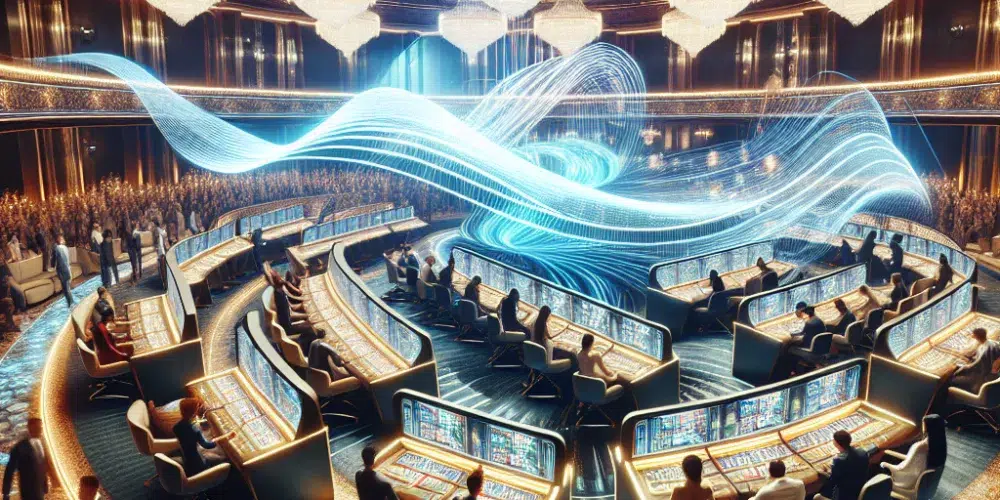In the ever-evolving landscape of casino gaming, a groundbreaking trend has started to reshape the roulette experience, thrusting it into the digital age with unprecedented momentum. Virtual Reality (VR) Roulette is emerging as the new frontier in immersive gaming, blending traditional casino allure with cutting-edge technology. This innovative modality is not just revamping the way players engage with one of the oldest casino games but also setting new standards for user engagement and gambling technology.
The Transformation of Roulette Through VR Technology
With the introduction of VR technology into roulette gaming, casinos are experiencing a notable shift in player interaction. Users equipped with VR headsets can now enjoy a full 360-degree view of a digitally created casino environment, complete with the sights and sounds of a traditional casino. This modern twist to roulette extends beyond mere visual enhancements, offering a fully interactive and immersive experience that replicates standing at a real roulette table.
Player Experience and Engagement
Virtual Reality Roulette allows players to interact with their gaming environment in ways previously confined to the imaginations of sci-fi enthusiasts. From the spin of the wheel to placing chips on the table, every action is enhanced to provide a tactile and engaging experience. This increased engagement is leading to higher session times among players, suggesting a deeper connection with the game due to the immersive qualities of VR.
The Technological Edge
The technology behind VR Roulette involves sophisticated software that supports real-time motion capture, advanced graphic rendering, and effective user interface design. These technologies ensure that the virtual roulette wheel behaves according to realistic physics, and player interactions are reflected instantaneously, thus maintaining the integrity and excitement of the game.
Market Impact and Future Projections
The introduction of VR into roulette and other casino games is timely, considering the increasing demand for interactive and immersive gaming experiences. Industry analysts predict that VR-based casino games will continue to grow, potentially increasing the casino industry’s revenue by a significant margin over the next decade.
Economic Insights
Casinos adopting VR technology are paving the way for a new era of digital gaming that attracts a younger, tech-savvy demographic. This shift not only revitalizes traditional games like roulette but also introduces a new revenue stream that could reshape financial models within the industry.
Forecasting the Next Wave of Casino Innovations
As VR technology matures, future enhancements may include multiplayer capabilities, allowing friends to meet virtually at the roulette table despite physical distances. Moreover, the integration of artificial intelligence could lead to personalized gaming experiences, adapting the digital environment according to individual player preferences and past behavior.
Challenges and Considerations
Despite the promising expansion of VR Roulette, there are several challenges that casinos must navigate. The cost of VR technology and the need for continuous updates and maintenance pose significant hurdles. Additionally, ensuring that the gambling experience remains fair and secure in a digital space is paramount to maintain trust among users.
Regulatory Landscape
As VR Roulette and similar technologies take root, regulatory bodies are tasked with overseeing this new realm of digital gambling. Ensuring compliance with both national and international gaming laws will be crucial as more casinos integrate these technologies into their offerings.
User Accessibility
Another consideration is the accessibility of VR technology to the average consumer. As it stands, the cost of VR headsets and compatible equipment might be prohibitive for some, potentially limiting the widespread adoption of VR Roulette.
Conclusion: The Future is Now
Virtual Reality Roulette represents not only a significant technological advancement in casino gaming but also a new chapter in how humans interact with digital environments for entertainment. As this technology continues to evolve and become more accessible, it promises to offer a fresh lease on life for traditional games, making them relevant and exciting for new generations of players. The fusion of technology and traditional gaming could well be the blueprint for the future of the entire gambling industry, indicating that in many ways, the future of gaming is already here.

David Garato is a luminary in gaming journalism, renowned for peeling back the curtain on the gaming world with his witty and insightful commentary. A decade into weaving stories from the pixelated edges of indie games to the expansive universes of AAA titles, David’s work is a thrilling blend of analysis and adventure. When not writing, he’s live-streaming, sharing his gaming exploits with an engaged and growing audience. David doesn’t just write about games; he lives them, making him a trusted guide in the gaming community.


